Geography
St Edward's - A caring Christian Community where children achieve their potential, are confident in themselves and their abilities and are set on a positive path for life.
Children at St Edward's are curious about the world around them. They ask thoughtful, probing questions and love pouring over maps and globes and learning about new places. It is our ambition that they maintain this enthusiasm for geography and develop lifelong skills and knowledge as geographers.
The study of geography is about more than just memorising places on a map. It's about understanding the complexity of our world, appreciating the diversity of cultures across continents. In the end, it's about using all that knowledge to help bridge divides and bring people together.
BarracK OBama
At St Edward’s we believe that Geography allows children to begin to understand their place in our world, considering what is familiar to them, but also how their ‘world’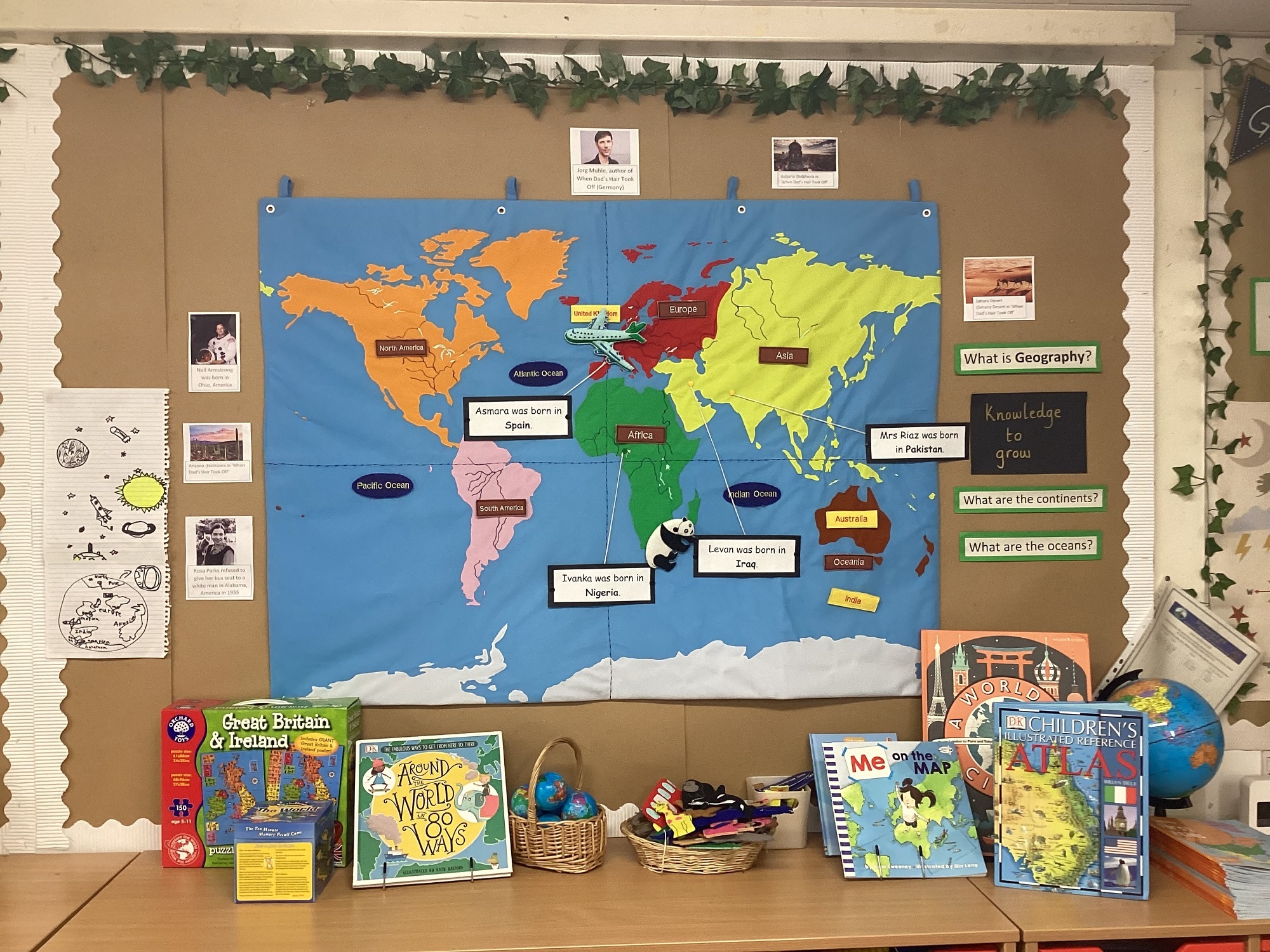 is different to that of others.
is different to that of others.
Geography allows children to develop their understanding of their immediate environment (home, school, town) and how they are part of a bigger environment (country, continent, world). This then builds their knowledge of the wider world and how people and places differ both in terms of physical characteristics and human characteristics.
At our school, the local area and our school grounds are at the heart of our geography curriculum. Children develop a sense of place in relation to their own environment and an understanding of the physical world around them and their community. We encourage our children to appreciate places and people all over the world. From starting in nursery, children are taught key geographical vocabulary which is then built upon as they progress through school. Through our geography curriculum, children also begin to understand the need to respect and care for the natural environment.
The core threads of the St Edward’s Geography Curriculum:
When selecting the knowledge and skills most appropriate for our children, we wanted to ensure that our decisions were informed by our overall vision for the school.
At St Edward's, we aim to inspire our children to be explorers. Our geography curriculum nurtures a sense of community and educates children so that they develop understanding of the world beyond their experience and compassion for others.
With this in mind, we identified key threads which would run through our geography curriculum:
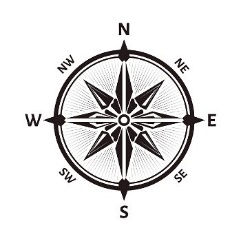
Exploration – We want our children to be curious. We aim for them to develop an understanding of where they are in relation to the rest of the world and to develop awareness of the world that exists beyond their own experience. We want to equip them with skills to be explorers and to develop a life-long love of learning.
 Compassion and Community – We want our children to learn about how humans interact with the environment and the impact that they have. We want them to develop empathy and an understanding of their importance and responsibility in the world. We want them to explore race and identity, knowing that everyone is equal and everyone’s heritage is celebrated.
Compassion and Community – We want our children to learn about how humans interact with the environment and the impact that they have. We want them to develop empathy and an understanding of their importance and responsibility in the world. We want them to explore race and identity, knowing that everyone is equal and everyone’s heritage is celebrated.
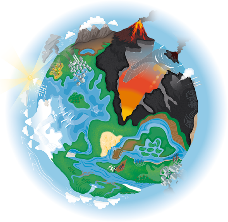
Creation – we want our children to look at the world with a sense of wonder and curiosity about why the physical world is the way it is and how processes have come together physically to create it.
The geography projects we deliver are well sequenced to provide a coherent subject scheme that develops children’s geographical knowledge and disciplinary skills. We have selected our own sticky knowledge progression, and have adapted some of the Cornerstones Curriculum Maestro units to support the learning of this knowledge within different geographical contexts.
All year groups deliver a main Geography unit during the Spring term and deliver smaller units which either introduce new concepts or revisit and review those already taught during the Autumn and Summer terms.
|
|
Autumn Term |
Spring Term |
Summer Term |
|
R |
Me and My Community, Marvellous Machines |
Dangerous Dinosaurs, Once Upon a Time |
Sunshine and Sunflowers, Big Wide World |
|
Y1 |
Our Town: Castleton |
Bright Lights, Big City |
Earth Science: Seasonal changes |
|
Y2 |
Let’s Explore the World |
Captivating Castleton |
The UK and Beyond |
|
Y3 |
Revision of prior knowledge |
Rocks, relics and rumbles |
Castleton Enquiry and Carbon Footprint |
|
Y4 |
Interconnected World |
Misty Mountains, Winding Rivers |
Revision of prior knowledge |
|
Y5 |
Investigating Our World |
Sow, Grow and Farm |
Revision of prior knowledge |
|
Y6 |
Our Changing World |
Frozen Kingdom |
Revision of prior knowledge |
A Curriculum for Our Pupils
We have identified some core barriers that the children of our school face when they are accessing the curriculum, and we intend to deliver the geography curriculum with an approach that addresses these:
- Vocabulary – we ensure that our topics are planned with careful and deliberate vocabulary progression. Teachers all have a copy of the St Edward’s Glossary so that the definitions children are given are consistent and accurate across school.
- Communication and teamwork skills – our geography curriculum is enquiry-based which lends itself to teamwork. Children can learn to take different roles within a team while carrying out the enquiries. Oracy opportunities are embedded in medium-term planning
- Resilience – we design challenging tasks in our geography curriculum, allowing children to experience failure and errors in a safe environment, scaffolded by the implementation of growth mindset training
- Differing and sometimes limited life experiences – We offer a curriculum of breadth and wider opportunity. We provide children with opportunities to expand their knowledge and experience of geography beyond the classroom through: assemblies celebrating environmental and ecological events; trips out of school to support fieldwork; School ecocouncil information and activities
A Curriculum for All Pupils
Ambition
Our ambition in Geography for children with SEND is broadly in line with our ambition for all children.
We believe that we need to be ambitious about what our children with SEND can achieve. We should take into consideration their barriers to learning but we shouldn't let these limit their opportunities - just because they find reading or writing difficult, it doesn't mean that they won’t be able to interpret a map or gather geographical data to prove or disprove a hypothesis.
Access (How we may support children with SEND to achieve in Geography)
-
At the start of units and lessons, children revisit prior knowledge and vocabulary.
-
Children have visual knowledge organisers which map out the key knowledge and vocabulary within each unit of work. These can be used for pre-teaching new vocabulary prior to the lesson, to help children visualise the concepts they are using in class and can help with spelling and writing activities.
-
Check in - For children with SEND, a Geography lesson can be overwhelming with all the new information they are given as well as trying to comprehend ideas that may be very alien to them. Teachers and TAs make a point of checking in with these children and offering further support or scaffolding where necessary.
-
Working walls - Images and facts are displayed on working walls and teachers refer to these regularly.
EYFS
In preparation for the Year One Geography curriculum, in EYFS, children begin to develop their geographical knowledge by exploring features of our school.
Simple maps are used to investigate different places as we begin to compare and contrast different environments. Lands and places from stories shared together are mapped out. Children have rich opportunities to make use of school grounds to enhance and apply their skills as geographers.
Throughout the year, children observe and discuss the weather and seasonal changes. Children also learn about the different jobs which people do in our community.
Literature is used to enhance children's geographical understanding. Through the book Handa's Surprise, children learn about life in a different country and use maps and globes. We also aim to avoid stereotypical ideas and provide plenty of pictures so that children can understand the contrasts within a country.
Teachers model how to draw simple comparisons between their own country and other countries and children experiment with comparative language.
They begin to build a bank of geographical vocabulary.
Assessment in Geography
We believe that assessment in geography should:
- Help pupils make progress
- Identify misconceptions and areas for development
- Reveal the effectiveness of teaching and learning strategies
- Help us report to parents
Our approach to assessment is based on the following underlying principles:
Active geography – Pupils should DO geography, rather than just listen to it by being engaged in practical activities in and beyond the classroom. They may sometimes be taught skills discretely, but this is with a view to later application within a context.
Geographical voice – pupils should have ample opportunity to engage in discussion, debate and oral presentation rather than just writing about the geography they are doing so that it is geographical knowledge and understanding, not literacy, that is being assessed
A planned end point – all learning intentions should be planned against expectations and with continuous formative assessment of progress in mind
We believe that assessment should be useful to teachers so that they can adapt their teaching as necessary and useful to children so that they have an understanding of how they are learning and how to develop further. We have planned assessment opportunities into our curriculum so that teachers are able to confidently evaluate knowledge in the short term, medium term and long term:
Short term – all classes will use the geography knowledge organisers so that pupils are involved in the process and have an overview. Teaching incorporates continual formative assessment and children are quizzed on their knowledge during and after sessions. Teachers make use of the curriculum feedback book when necessary so that they can make notes about misconceptions/ areas to develop or revisit and adapt teaching accordingly. Taught sessions operate using a hands-down policy so that the teacher can target those children they need to assess more carefully. Parents will have access to the knowledge organisers via the website.
Medium term – all classes revisit prior learning at the start of every lesson. Teachers make use of displays so that children can see their learning path and are encouraged to recall relevant knowledge. Assessment tasks in the form of enquiry questions are planned in to each unit of work so that teachers can evaluate how well children have grasped learning within that unit (see the grid below). Spaced practice will deliberately be applied by teachers to allow the pupils and themselves to assess and review knowledge. Children will complete locational knowledge quizzes in which they will be expected to locate the places identified in the progression document for their year group. Any significant information arising from these quizzes will be recorded in the feedback book so that teachers can plan next steps in learning using this.
Long term – all units of work begin by revisiting knowledge and skills acquired in previous units and year groups. Each year group will have the quiz cards for previous learning and will use these throughout the year.
Teachers should make use of the feedback books when children are completing an assessment task to keep a record of any child who either struggles to retain the sticky knowledge or apply geographical skills or might need stretching. This information can be accessed by leaders and discussed within pupil progress meetings so that teachers are encouraged to reflect on this information and consider future actions to support specific children. At the back of the feedback book, teachers will highlight sticky knowledge to show which areas need strengthening next year and this book will be handed to the next teacher to inform their long-term planning for geography.
Assessment tasks
|
|
EYFS |
Year 1 |
Year 2 |
Year 3 |
Year 4 |
Year 5 |
Year 6 |
|
|
What do we know about where we live? |
Create maps to show the location of landmarks in London |
Use the four cardinal points to describe the location of human features in Castleton |
Can you use the eight compass points to navigate? |
Use a map of North America to describe the location of |
Use an ordnance survey map to identify and explore the location of key features of Castleton |
Use geographical skills to track Santa. |
|
Compassion and Community |
What should people do with rubbish? |
How can humans protect the environment? |
Campaign to reduce the impact of plastic on the environment. |
Campaign to encourage people to reduce their carbon footprint |
How can natural resources be used to create sustainable energy? (e.g. wind power) |
How can we support the local food bank to support those for whom food is not readily available? |
Explain how a particular animal is affected by climate change and campaign about how we can help. |
|
Creation |
How can the weather affect our environment? |
How might weather affect human activity in different parts of the world? |
Compare the physical characteristics of the four countries of the UK |
Why do volcanoes and earthquakes happen? |
Explain the stages of the water cycle |
Describe how physical features across the UK affect agricultural land use. |
Describe the physical features of polar landscapes |
|
Field Study
|
What can we see in our school environment? |
Is Castleton a village, town or city? How do you know? |
Which human features are most used in Castleton? |
How is land used in Castleton? |
Explore the hypothesis: Castleton has good transport links |
What typical features and evidence can we find to identify and classify Castleton? |
How safe are Castleton’s roads? |
Work Books
We would like our children to be able to record their geographical understanding confidently and effectively.
Teachers may use ‘sticky knowledge stickers’ or children may write which sticky knowledge/skill they were focusing on within a session so it is clear to the children exactly what the learning is and it can be used to jog their memory.
Teachers may choose to include photos, but this will be done purposefully (e.g. to use in a later lesson to remind children what they did previously and how the activity was linked to the learning point.
We know that the subject leader and senior leaders need to know how well children are learning in this subject, so they should monitor progress by:
- Discussions with pupils, looking at the knowledge organisers and discussing the assessment tasks which have been completed. Attention should be focused on knowledge and retention of the sticky knowledge and geographical skills outlined in the geography progression documents.
- Discussion with teachers, or examination of medium term planning to check that learning points are effectively sequenced in appropriate sized chunks, and that teachers are considering opportunities for spaced practice, interleaving and retrieval.
- Lesson drop-ins so that leaders gain an awareness of what learning in geography looks like across the school, and can action plan or feed back accordingly.
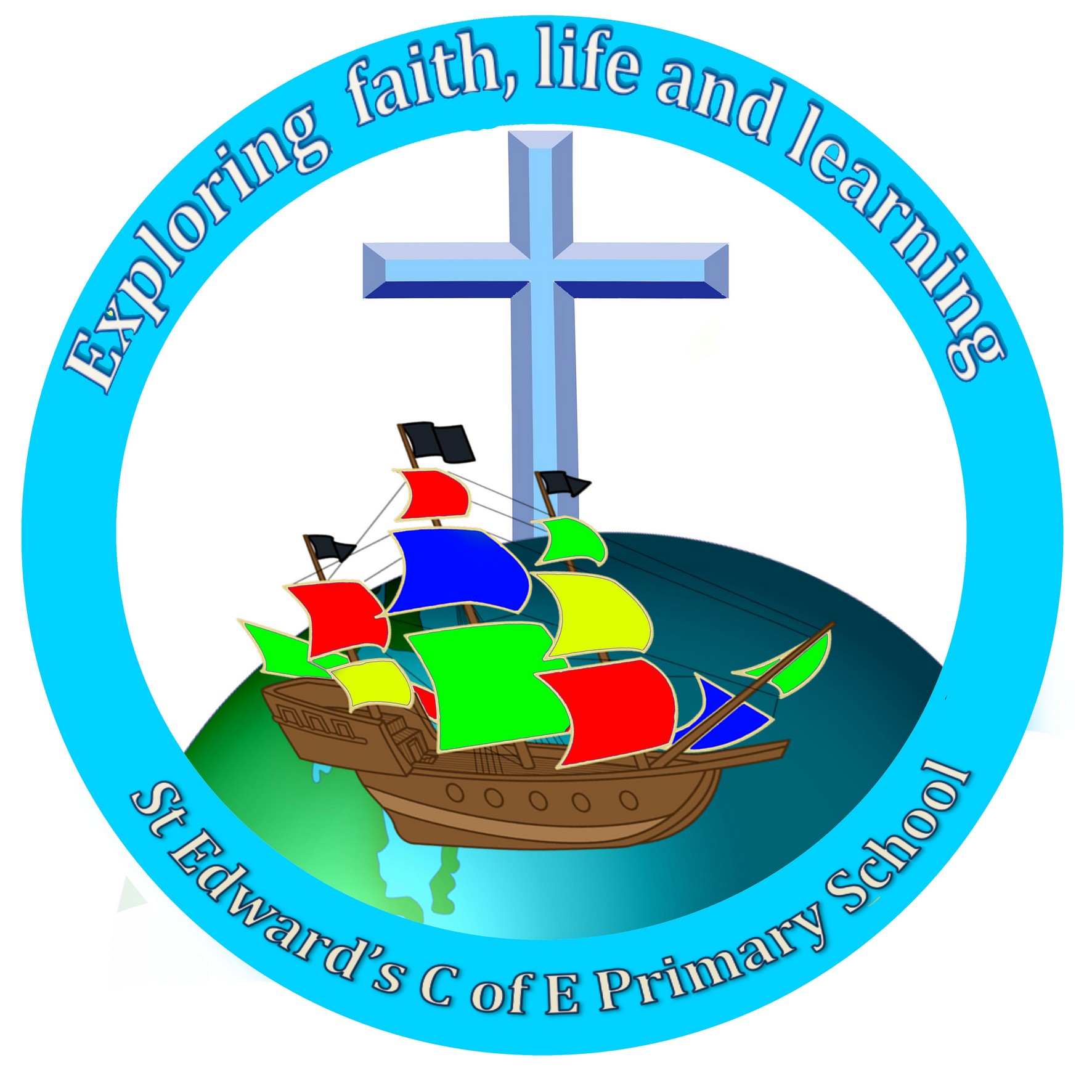
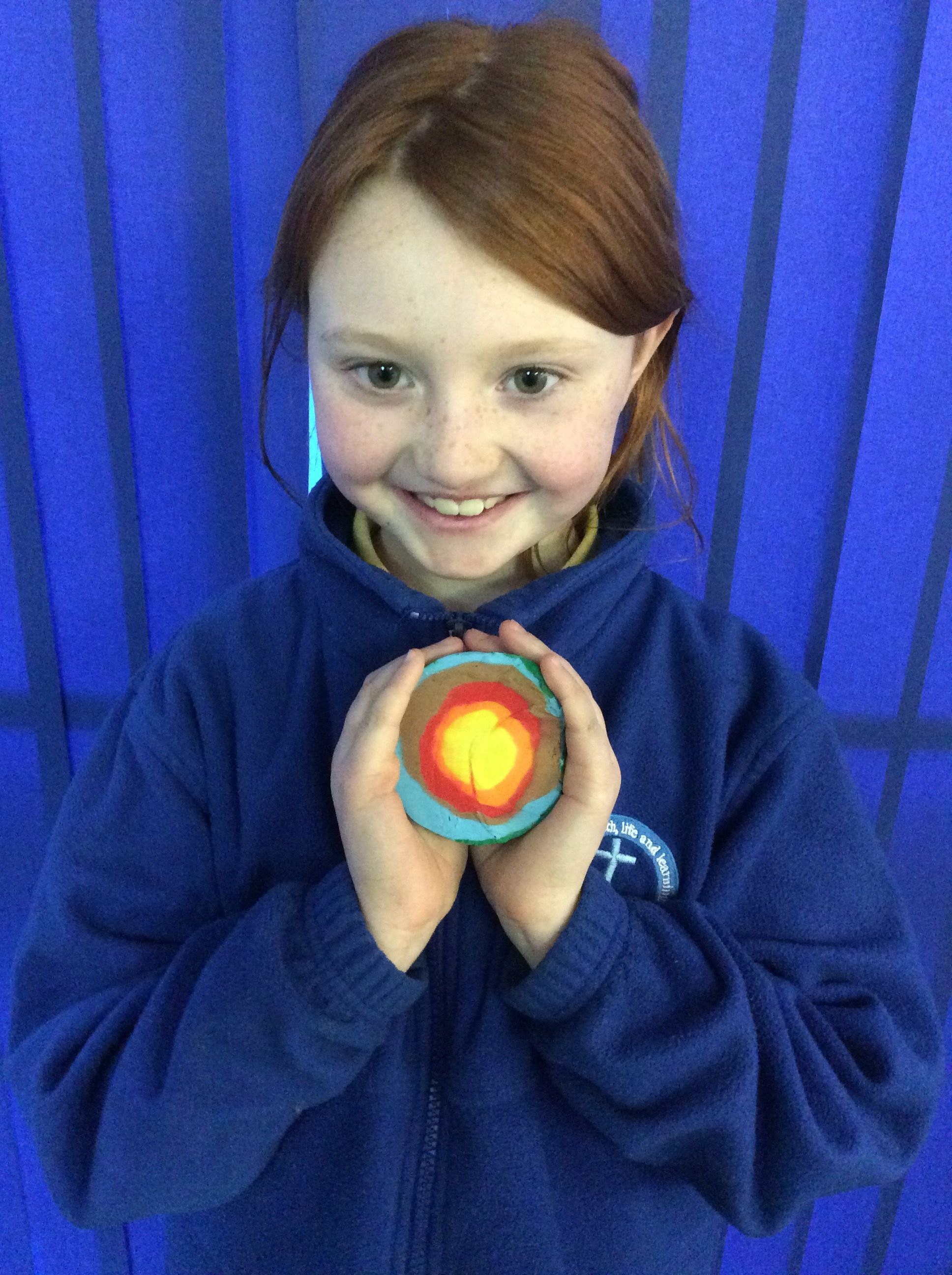
 Exploration
Exploration

